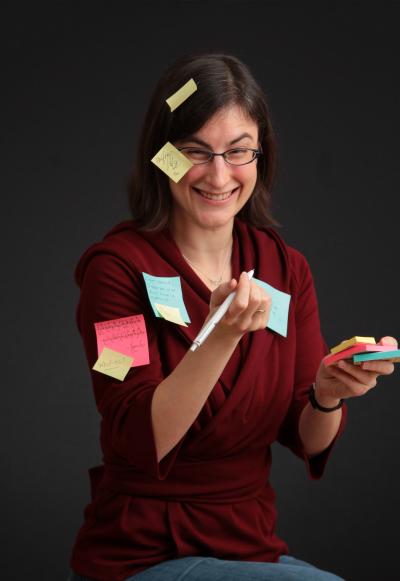Alumni Spotlight: Bridget Veerhoff, MHCI '07

Bridget Veerhoff is a 2007 graduate from the Accelerated Masters of Human-Computer Interaction (MHCI) at Carnegie Mellon University, but this was not her first introduction with the Human-Computer Interaction Institute (HCII). Veerhoff completed a double major in physics and human-computer interaction for her bachelor’s degree, also at Carnegie Mellon. She shares how she came to find an interest in both physics and HCI, and her experiences applying MHCI methods to her career.
How did you come to find an interest in both physics and human-computer interaction?
I love physics, and the physics department here at CMU, but I wanted to see the end results of my work sooner than I could there. In physics, you can work on an experiment for decades before seeing results, if you see them at all. Halfway through my undergraduate studies at Carnegie Mellon, I discovered the Human-Computer Interaction Institute. Studying HCI means working on projects that have potential real-world impacts in weeks or months, rather than decades. So I added a bachelor’s in HCI, and then continued on for the accelerated master's degree. The master's program is such a great deal, and added a great deal of depth to my expertise.
What do you do today? Was it what you expected to do?
It’s not at all what I expected. I went to a career fair during my time at CMU as a master’s student and interviewed with a lot of companies, including Expedia. I explained my passion for user experience to them, and they said, “M-hm, OK - we want you to interview as a project manager.” I didn’t even know what that was at the time. They were looking for someone to project manage front-end work and who had a solid end-user oriented perspective; my user experience background gave me that. I never could have predicted it, but I’m very happy I took the job.
Did you stay with project management or go into a more traditional UX position?
I spent my first two years as a project manager with Expedia still considering myself to be a UX person, not a PM. I did move on to a position where I worked as a user-centered design consultant, but ultimately decided to go back to project management. What really stuck with me was a conversation I had with my current boss, during the hiring process there. He asked if I was a blue-sky thinker or feet on the ground thinker. As in, am I driven by a passion for big, beautiful ideas or by figuring out what it takes to actually accomplish those beautiful ideas? Am I a visionary or the person who says, “How do we make that a reality?” It was a real “ah-ha!” moment for me, and it’s when I really embraced my career in project management.
Where are you now?
I am a Senior Project Manager at Forum One, which is a full-service digital agency based out of the Washington D.C. area. I work out of our Seattle office on web projects for non-profits, government agencies, foundations, and educational institutes. I absolutely love what I do and the people I work with.
Did any one part of your studies at MHCI help prepare you for your position?
Even though I am not doing what I expected to do, my MHCI degree gave me a strong jumping off point. Having a strong knowledge of user centered work means that I am able to do a better job in my role as project manager for front-end, user-oriented projects.
The skills I learned during the Capstone Project in particular were important to my career. The Capstone project is long enough that you really get to dive into your real world problem, which teaches you a lot of practical soft skills in a very hands-on way. The team is large enough (4-5 students, 2 faculty mentors, and your external client) that you have to learn how to coordinate as an effective team and handle some stakeholder communications, which are very important skills to have for any modern work. Applying what you learned across an intensive, two-semester project really ties those concepts together and really solidifies the conceptual foundation the MHCI gives you. You can really take the MHCI degree in many different directions.
How would you help students today decide if project management is a good fit for them?
As a project manager, you have to be a little anxious. It’s not a type-A thing (my desk is covered in sticky notes!), but you have to be the one always thinking about what we can do better or what else we need to prepare for. You need to enjoy making sure that things happen, even if you aren’t the one doing it. I like to explain too, that I get my job satisfaction through other people’s success. When my team succeeds, when my client succeeds, that is what makes me happiest. If that sounds like you, project management might be a great fit.
Are you a Carnegie Mellon Human-Computer Interaction Institute alum? We want to stay connected! You can send us news about yourself, come to campus for a Q&A with students, or give an alumni interview. Send us an email to get in touch. We want to share your news with other alumni, students, faculty, and staff. You can get more alumni news from our LinkedIn alumni group as well.

